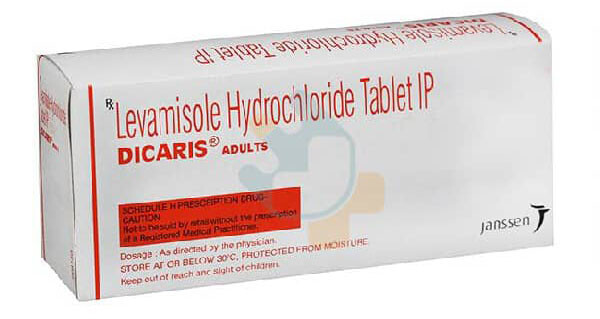Dicaris is a brand name of Levamisole medicine. The main purpose of this drug is to fight against helminths. It neutralizes most of the known types of helminths and strengthens the immune system after it was hit by parasites.
The pharmacological agent Levamisole provides nonspecific immunostimulating properties. These properties were discovered quite recently, but are already actively used in therapeutic practice.
According to clinical studies, Levamisole restores several immunological functions in humans and animals by acting on macrophages, T cells, and neutrophils. Thus, it has shown good results in the treatment of diseases, such as rheumatoid arthritis, Crohn’s disease, colorectal carcinoma, aphthous stomatitis and many others. All these diseases belong to different categories but have a similar origin, namely, the manifestation of immune dysfunction.

In many countries, Levamisole (under the name Dicaris, or other trade names) is listed as a vital and essential medicine. In the United States, this medication is approved in some areas (not all of them) and is considered a prescription drug.
Levamisole has been used since 1969 and is included in the WHO Essential Medicines list. But the range of this drug application grows every year, as its new therapeutic possibilities are being discovered.
Extended Indications
Dicaris can be used as an anthelmintic drug in:
- ascariasis;
- necatoriasis;
- strongyloidosis;
- ancylostomiasis;
- trichostrongyloidosis;
- enterobiasis;
- toxoplasmosis;
- trichuriasis.
This drug is usually used for severe forms of helminthiasis, in which other drugs fail to combat parasites. In addition, it can be used in cattle, pigs, and domestic dogs.
As an immunomodulatory agent, Dicaris can be used for:
- cancer: Crohn’s disease, colon cancer, Hodgkin’s disease;
- rheumatoid arthritis (as an additional component of therapy);
- Reiter’s disease;
- prevention of diseases in patients with immunodeficiency or immune system pathologies.
As a dermatological agent, Dicaris can be used for:
- warts;
- lichen planus;
- aphthous ulcers;
- leprosy.
Levamisole is prescribed by the attending physician, and its administration depends not only on the diagnosis but also on other drugs used for patients’ treatment.
Instructions: Scheme and Dosage of Dicaris
The dosage and the treatment regimen depend on the patient’s condition, their age, and the severity of the disease.
For Helminth Invasion
Dicaris is administered orally as a tablet. The treatment regimen assumes taking a single dose of 150 mg. This regimen is suitable for patients over 14 years of age.
For children under 14 years old, the drug is prescribed in exceptional cases when the intended benefits of treatment outweigh the risks. The decision is taken by the attending physician only.
When used in children, the dosage of Levamisole is determined according to body weight, based on the following formula: 2.5 mg per 1 kg of body weight. This dose is taken once. If the child weighs 25 kg, the dosage should be 62.5 mg. Your doctor will help you divide the tablet correctly and take the dose you need.
The tablets should be taken with a full glass of water. It is recommended to use them in the evening or before bedtime. Helminths are mostly active in the evening and night; therefore, this period of time is best for eliminating the parasites.
Two weeks after treatment, patients should undergo diagnostics to assess the treatment’s effectiveness. In case of unsatisfactory initial treatment results, the patient is prescribed 1 more dose of Levamisole.
For Immunostimulating Therapy
Dicaris is used in short cycles of 3 days every 2 weeks, that is, 2 cycles of 3 days per month.
Patients can take the whole daily dose of 150 mg of Levamisole in the evening. The tablet can be taken regardless of food intake – its bioavailability does not change in any way. You can take a pill only with plain water (at least half a glass).
Important Information:
- It is contraindicated to take more than 150 mg per day, as this can cause overdose symptoms.
- It is not recommended to take the medicine for more than 3 days in a row, as the load on the liver and central nervous system increases, which can provoke side effects.
- In case of side effects, the treatment must be temporarily discontinued. Re-taking the pills is possible at a lower dosage if allowed by the attending physician.
Possible Side Effects
Like all anthelmintic drugs, Dicaris can cause quite a wide range of side effects. However, there are no records of mass cases of severe adverse reactions in clinical practice.
The severity of side effects and their number depend solely on the correctly selected treatment regimen and dosage.
The Most Common Side Effects:
- nervousness, sleep disturbances, worsening of mood, nausea, dyspepsia, constipation, distorted sense of smell or metallic taste in the mouth, myalgia.
Rare Side Effects:
- weakness, vomiting, headache, high cholesterol level, fever, skin rash (allergic reaction).
In case of an allergic reaction, one should take antihistamine medicine as soon as possible and visit a doctor.
Precautions
As mentioned above, side effects most often appear as a result of inappropriate use of the drug. Another reason for adverse reactions is non-compliance with precautions.
- alcohol consumption is strictly contraindicated within 24 hours after taking the pill. It is also not recommended to consume alcohol 12 hours before Dicaris intake. For patients with impaired metabolism, the time should be doubled.
- Dicaris is contraindicated for women during pregnancy and lactation. There is a possibility of penetration of active substances through the placental barrier, which in turn poses a risk to the fetus. In experimental studies on cows, Levamisole has been found to be excreted with milk. This means that it can potentially enter the baby’s body during breastfeeding. In case of an urgent need to take Levamisole during lactation, breastfeeding should be discontinued.
- Levamisole is prescribed with extreme caution to patients with chronic pathologies of the liver, kidneys, and central nervous system.
- Patients with blood diseases (suppressed hematopoiesis, blood clots, etc.) should first consult a doctor. In a worst-case scenario, Levamisole may cause thrombocytopenia, as well as a decrease in white blood cell count. Therefore, the drug is contraindicated in agranulocytosis.
Medications That Dicaris Must Not Be Combined With
- When Levamisole interacts with ethanol, a disulfiram-like reaction occurs, and the patient may experience edema, vomiting, allergies, headache, etc.
- When taken simultaneously with Warfarin, the risk of bleeding due to blood-thinning increases.
- The toxicity of Levamisole increases when taken with lipophilic agents, so their number must be reduced or canceled during treatment.
Storage
Each package of Dicaris contains either 1 or 3 tablets at the dose of 150 mg or 50 mg. Each tablet comes in a separate blister for easy storage. You can store the pills in closed blisters only, at room temperature below 25 degrees Celsius. Keep out of the reach of children.
To sum up, Dicaris offers a valuable treatment choice for people with autoimmune illnesses such as rheumatoid arthritis and parasite infections. Thanks to its capacity to regulate the immune system and eradicate dangerous parasites, patients may be able to reclaim control over their health and receive relief from incapacitating symptoms. For patients seeking effective treatment choices for these medical problems, Dicaris is a ray of hope due to its well-established efficacy and tolerable adverse effect profile.
He knows everything about medications – to which pharmacological group the drug belongs, what components are included in its composition, how it differs from its analogs, what indications, contraindications, and side effects remedy has. John is a real pro in his field, so he knows all these subtleties and wants to tell you about them.

































